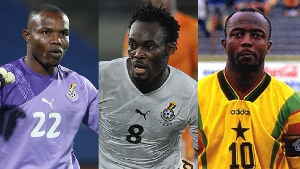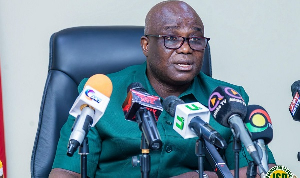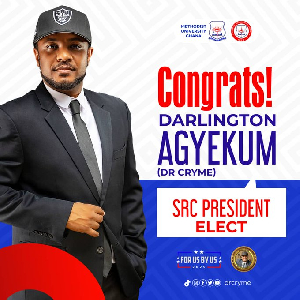By Dr. Michael J.K. Bokor
E-mail: mjbokor@yahoo.com
July 15, 2010
This incident involving Abongo and the others confirms that bribery and corruption, one of the major obstacles to moral uprightness in public office-holding is not being fought in any way at all. Bribery and corruption thrived under the previous governments and continues to be glorified although openly condemned as vicious, mostly by the very people who indulge in it or whose responsibility it is to fight against it. We have numerous instances of serious occurrences of big-time bribe taking by government officials to confirm our claim that bribery and corruption is a major national problem:
• Under Nkrumah’s CPP, his Finance Minister, Komla Agbeli Gbedemah’s improprieties led to his fleeing away in 1961 when Nkrumah moved to deal with him.
• In the era of the NLC, Gen. J.A. Ankrah, Chairman of the NLC, was disgracefully removal from office in 1968 over the Nzeribe bribery scandal.
• Although perceived as excessive and extra-judicial, the shooting to death by firing squad of the former military Generals (three of whom were former Heads of State) over their deep involvement in improprieties (bribery and corruption or acquisition of ill-gotten weal through inexplicable circumstances and sources) reflects the rot that existed in public office-holding between 1969 and 1979.
• In the era of Dr. Limann’s PNP administration, the situation didn’t change for the better, despite the glaring evidence of the “house-cleaning exercise” that had just preceded the ushering into office of Limann.
• Rawlings’ era provided clear instances of how fruitless the fight against corruption and bribery could be. Some of the government’s functionaries were fingered for indulging in improprieties (e.g., the all-powerful, all-knowing PV Obeng, Col. Emmanuel M. Osei-Wusu, and Isaac Adjei-Marfo’s case with the CHRAJ). Others would wait till the assumption of office by Kufuor’s NPP to be exposed and punished (e.g., Kwame Peprah, Victor Selormey, Dan Abodakpi, for instance).
• In the 4th Republic, we all saw the intensification of bribery and corruption under Rawlings and Kufuor and heard the alarming and irresponsible responses by officialdom to such deplorable conduct. Who will not remember the Richard Anane case and the dribbling that surrounded it as the very people who were expected to push the case against him turned round to be his sympathizers and staunch defenders?
As if that was not painful enough, Kufuor disappointed many when he emphatically stated that “Corruption had existed since the days of Adam” and followed up to taunt Ghanaians that he would not take action against anybody based on allegations in the press and that if anybody had any evidence of bribe-taking, he should “go to the Police with it.” In a half-hearted and belated demonstration of interest in doing what he had shirked, Kufuor moved to establish an Office of Accountability, which was based at the Presidency to be superintended over by him and whose members were government functionaries that he had hand-picked. How could those perceived to be corrupt themselves fight against bribery and corruption? The rest is history, right?
• Under President Mills, the situation is not different. Instances of bribery and corruption occur as usual. Alhaji Muntaka’s sordid deeds at the Ministry of Youth and Sports set the stage for this madness and mayhem in the misconduct of public officials. From Mahama Ayarigah and Alban Bagbin’s alleged manipulation of the system to acquire tractors to the Marbey and Johnson exposure (which led to the resignation of Yankey as Minister of Health) to Carl Wilson’s dealings concerning confiscated Vehicles and the current issue about the STX Korean project, there is ample evidence that nothing has changed or will change as far as bribery and corruption are concerned.
What is worrisome about this national problem is not only the lethargic attitude toward identifying and exposing these corrupt public office holders but the inability of the authorities to take firm action to punish the offenders. Those who indulge in bribery and corruption do so because they know that they will escape with their booty, damn the laws of the country. They know who their main defenders are and feel confident that with that effective backing, they will outwit the system.
Another troubling aspect is that because our politicians and public office holders involved in such sordid deeds are largely unconscionable, they remain adamant even when caught pants down indulging in bribery and corruption and will not voluntarily resign from office to preserve whatever little speck is left of their reputation. And they have people in government and the society to rely on for moral and political support.
Because members of civil society also benefit from such improprieties and have sold their conscience to the bribe givers and takers, they allow such people to continue to be where they are. Civil society cannot do anything against such people to compel them out of public office. Even if their nefarious acts land them in trouble, they still feel safe. They may descend into the doldrums only to resurface later on, fully recycled and reappointed to more juicy offices. Apathy on our part is a major factor that helps the vice and its perpetrators to persist.
Parliament itself has become a dumping ground for some of such vicious elements. Where such perpetrators are MPs, they may lose their Ministerial appointments but are assured of a safe haven in Parliament, where they resign themselves to and continue to indulge in bribery and corruption at different levels and in different guises and colorations. They know how to survive because they have reliable sources of sympathy and support in that House of politicians who appear in public as sworn political enemies but wine, dine, and wench together under the cover of darkness. And the tax-payers provide the funds they need to exist!
Our institutions of state are rotten to the core and cannot be relied on to help fight the vice and its perpetrators. Is it the CHRAJ or the Police, Judiciary, or what? Forget it. Who is not corrupt there?
At a broader level, it is disappointing that this ridiculous and criminal occurrence should be happening under this particular NDC government, considering all the hell-fire that its functionaries had spat at the Kufuor government over acts of impropriety such as the dubious and extortionist efforts by Yaw Osarfo-Marfo and his teams to commit gigantic fraud against Ghana through negotiations for loans from the fake IFC and the Chinese barber salon.
The NDC functionaries rose up in arms and castigated Kufuor’s government over such fraudulent conduct until those deals were abandoned and the government lost face. Why, then, should these same functionaries turn round to force a similar suspicious (if not despicable) agreement down our throats despite the vigorous protests from the NPP camp, civil society groups and stakeholders in the real estate industry? Shouldn’t there have been serious homework on this agreement and input from Ghanaian stakeholders sought before its being rushed to Parliament for debate and approval?
Again, what prevented the government from scrutinizing the agreement to smooth its rough edges before attempting to get approval in Parliament for it? What does the government have to hide or lose in this case? Sadly, the very people who were expected to do the scrutiny appeared to have already had their palms greased by the Korean company’s officials. No wonder they had been vehemently defending the agreement hitherto. You see how callous some people can be?
In all this muddy situation, President Mills has to be reminded that he is fast joining the ranks of those leaders whose lethargy against bribery and corruption will haunt them in life. Even after death, that stigma will stick to their names. If he singles himself out and rejects gifts for fear of being tainted with corruption or if he refuses to indulge in any dubious act but cannot provide the leadership drive for an effective national crusade against bribery and corruption, he will not impress anybody. He may praise himself over his self-denial and reassure himself that he is on top of things; but in reality, he will become a laughing stock. His is a particular disturbing puzzle: How can a seemingly upright man preside over a regimen (a systematic course) of bribery and corruption?
For now, Abongo and his fellow gift-takers may be redefining bribery and corruption to suit their strategies for self-defence in this instance of disgraceful conduct. But giving bribery and corruption a new name doesn’t change matters in their interest; it only reinforces public disgust against them and the large corps of public office holders. In the long run, it confirms long-held opinions that no matter who rules Ghana, bribery and corruption will reign supreme. That is the crux of the matter. We are already very much disappointed.
Opinions of Monday, 19 July 2010
Columnist: Bokor, Michael J. K.














